| | | OFFLINE | | Post: 17.573
Post: 276 | Registrato il: 28/08/2005
Registrato il: 20/01/2009 | Administratore | Utente Junior | |
|
 PENTECOST SUNDAY MASS
PENTECOST SUNDAY MASS
ST. PETER'S BASILICA
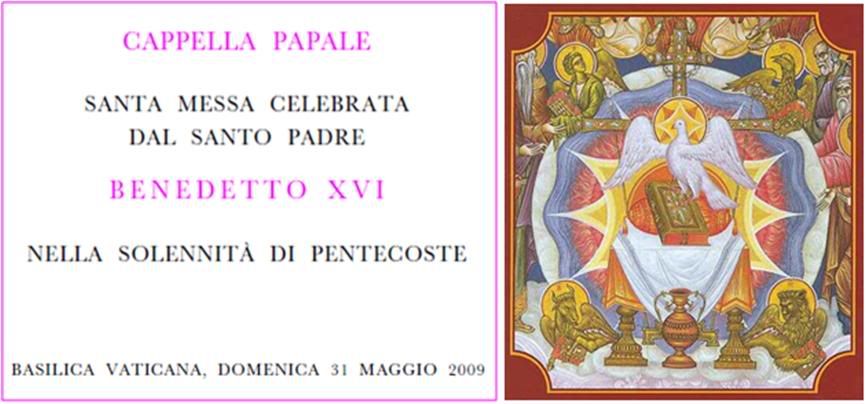
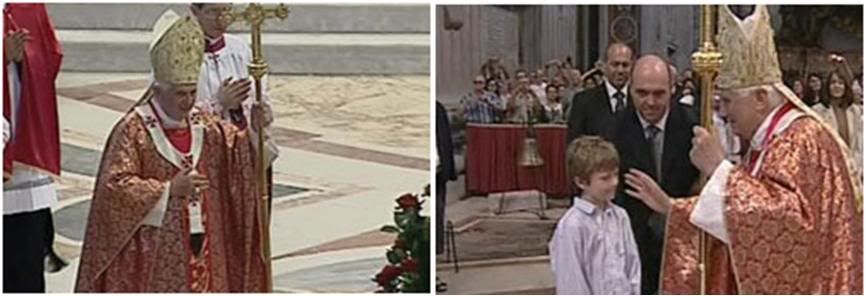
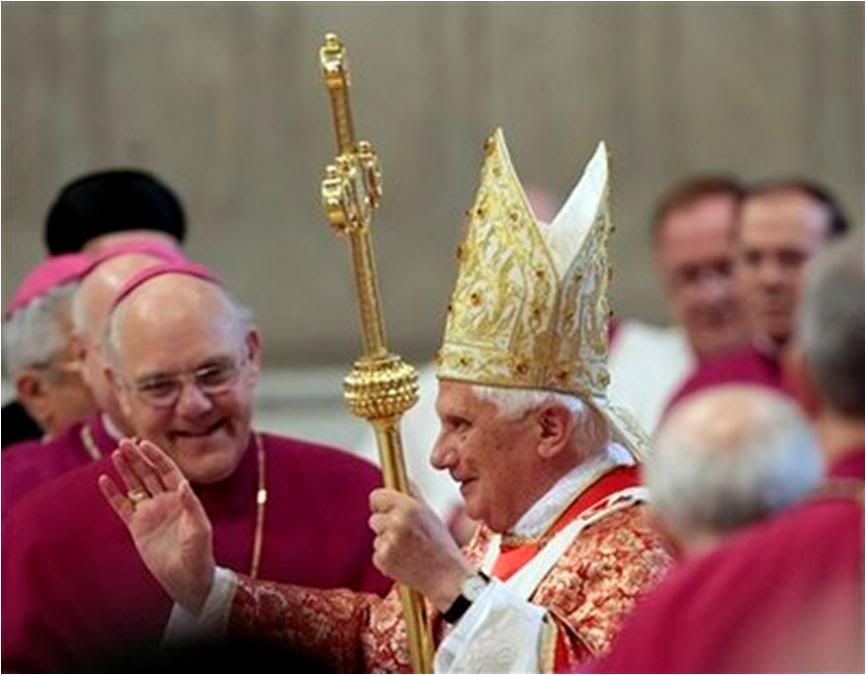
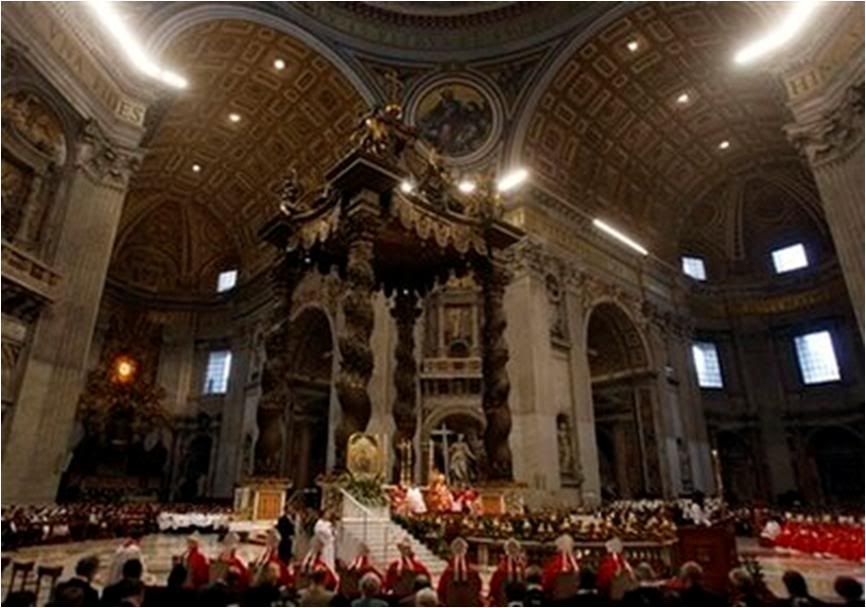
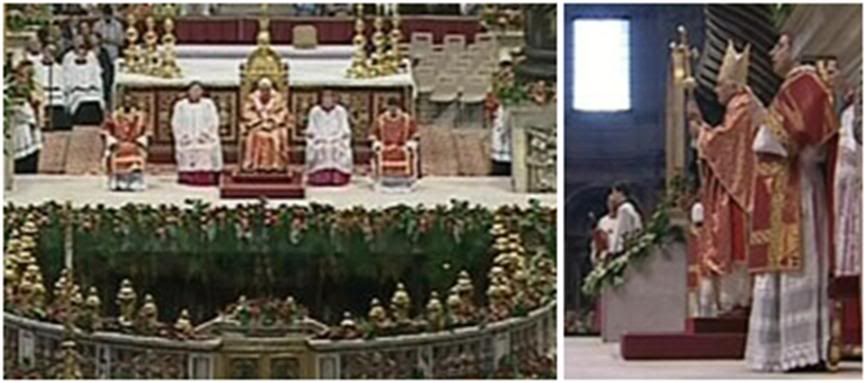 'The Spirit is fire of love'
'The Spirit is fire of love'

Vatican City, May 31 (AsiaNews) – In a St Peter’s Basilica draped in red – flowers, vestments, altar – Benedict XVI celebrated Mass for the feast of Pentecost, which commemorates the gift of the Holy Spirit to the apostles and Mary gathered in the Upper Room.
Lending greater solemnity to proceedings was the presence of the choir from Cologne Cathedral and the city’s Kammerorchester, whose 200 members, together with the Sistine Chapel choir, performed the 'Harmoniemesse', one of Joseph Haydn’s last masses, marking two hundred years since the composer’s death.*
In thanking them, the Pope described the work as “a sublime symphony of God’s glory”.
Of all liturgical feasts, said the Pope, Pentecost “distinguishes itself for its importance, because it represents the realisation of what Christ had announced as the aim of his earthly mission: 'I have come to set the earth on fire, and how I wish it were already blazing!” (Lk 12,49).
“The true fire – the Holy Spirit-," he said, "was brought to earth by Christ. He did not steal it from the gods, as Prometheus did in the Greek myth, but he made himself the mediator of God’s gift by carrying out the greatest act of love in history: his death on the cross”.
The Pope stressed that today “the normal path” to take in order to encounter the Holy Spirit and receive this “fire” is the Church. In order to receive it, so that the Church is “an extension of Christ’s renewing work”, Christians, like the disciples, must be “perseverant and in agreement in prayer”.
The Church, he said, “needs to be less ‘anxious’ for action and more dedicated to prayer”.
[ The rest of the account quotes freely from the Holy Father's homily, which is translated in full below.]
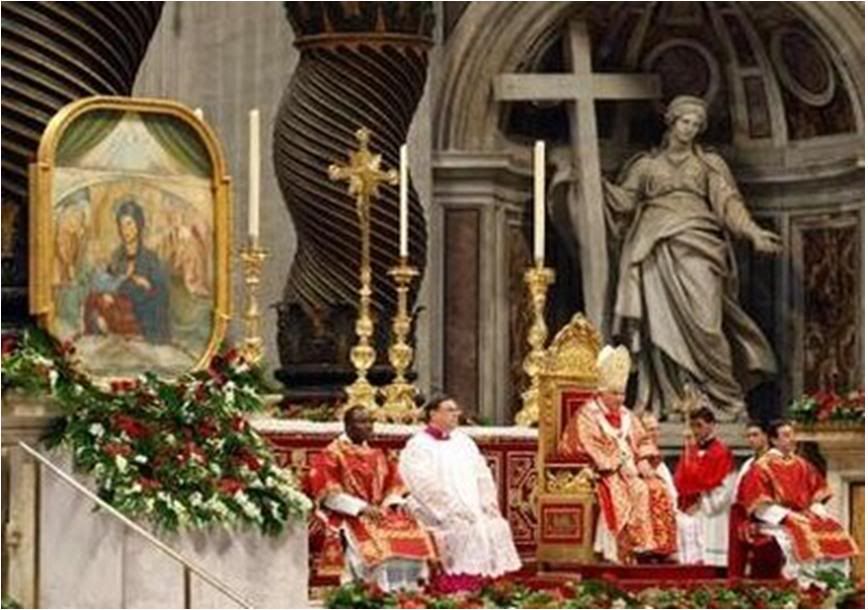
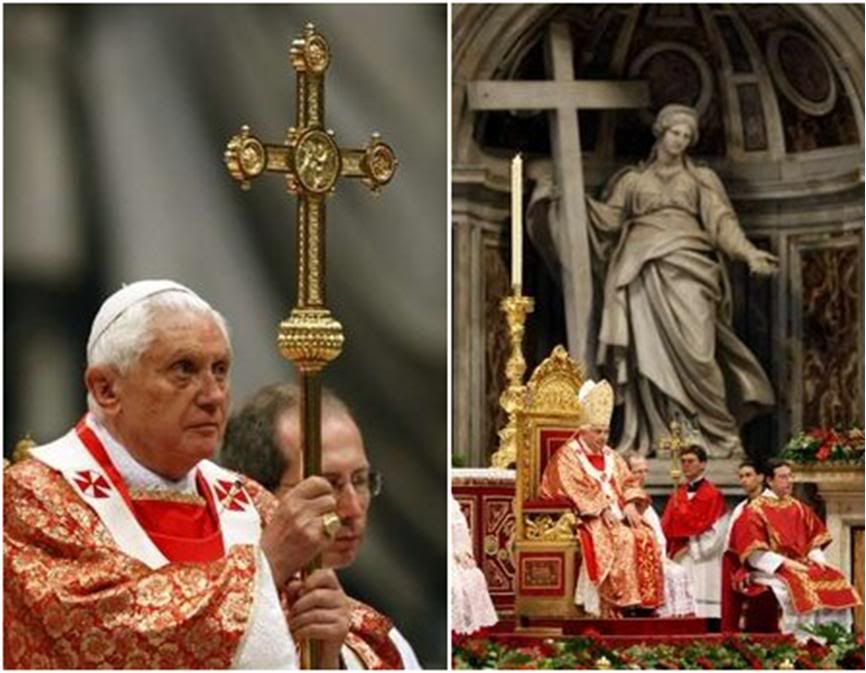
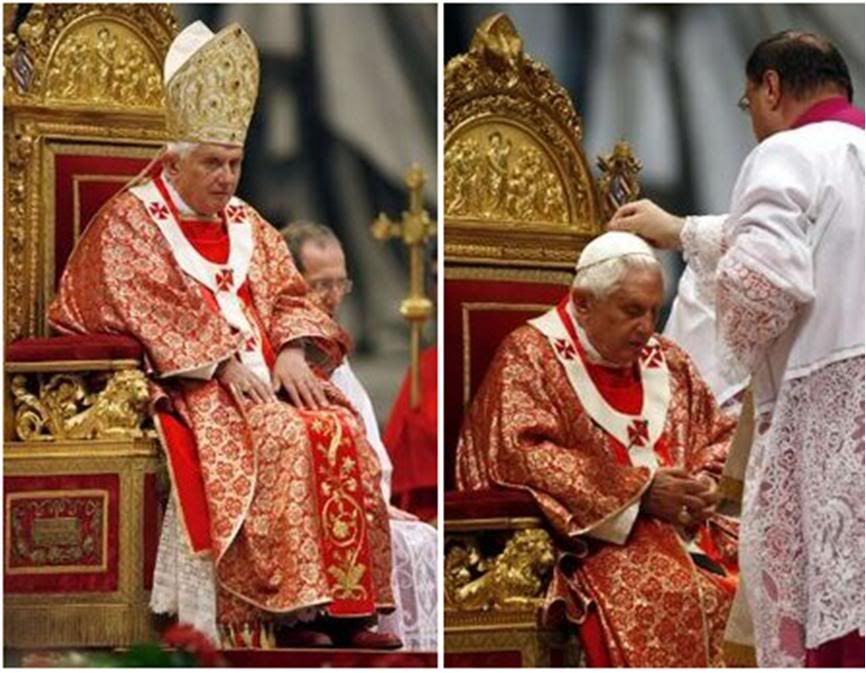
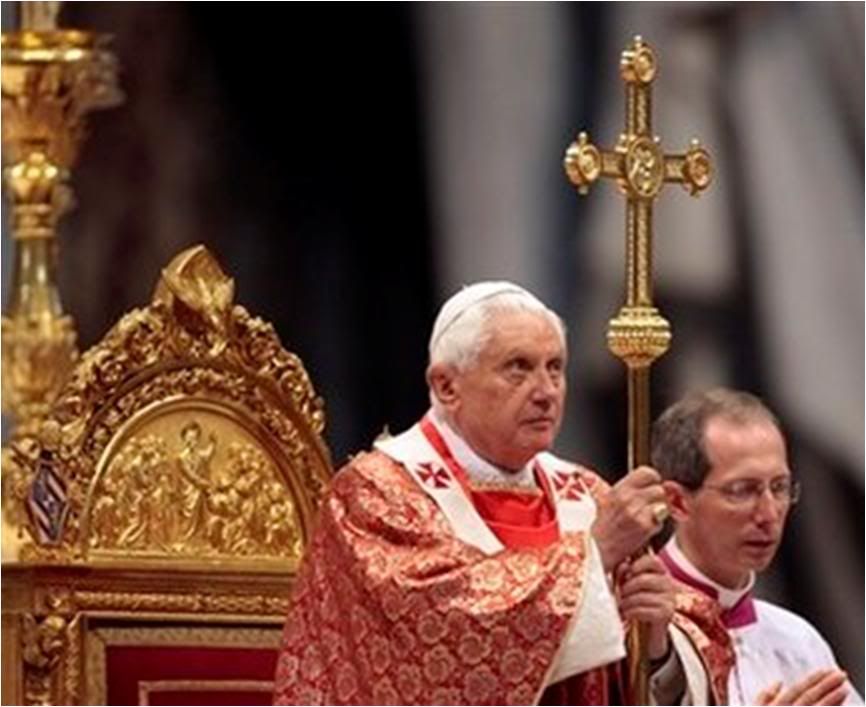
Here is a full translation of the Holy Father's homily:
PENTECOST SUNDAY HOMILY
Dear brothers and sisters!
Everytime we celebrate the Eucharist, we live in faith the mystery which is fulfilled on the altar - we participate therefore in the supreme act of love which Christ realized with his death and resurrection.
The one and the same center of liturgy and Christian life - the Paschal mystery - assumes, in various solemnities and feasts, specific 'forms' with additional significance and with specific gifts of grace.
Among all the solemnities, Pentecost is distinctive in importance, because it it is realized what Jesus himself had announced as the purpose of his entire mission on earth.
Indeed, as he went up to Jerusalem, he told his disciples: "I have come to set the earth on fire, and how I wish it were already blazing!" (Lk 12, 49)
These words find their most evident realization 50 days after the Resurrection, in Pentecost, an ancient Jewish feast which in the Church has become the feast par excellence of the Holy Spirit: "Then there appeared to them tongues as of fire... And they were all filled with the holy Spirit" (Acts 2,3-4).
The true fire, the Holy Spirit, was brought to earth by Christ. He did not steal this from the gods, as Prometheus did in the Greek myth, but made himself the mediator of the 'gift of God', obtaining it for us with the greatest act of love in history: his death on the Cross.
May God continue to give this 'fire' to every human generation, which is, of course, free to do with it how and as it pleases. He is spirit, and the spirit 'blows where it wills' (cfr Jn 3,8).
There is however a 'normal way' that God himself chose to 'cast fire down on earth'. This way is Jesus, his only-begotten Son who was incarnated, died and resurrected.
In turn, Jesus Christ constituted the Church as his mystical Body to prolong his mission in history. "Receive the Holy Spirit", the Lord said to the Apostles on the evening of the Resurrection, accompanying these words with an expressive gesture: he 'breathed' on them (cfr Jn 20,22). He thus manifested that he was transmitting to them his Spirit, the Spirit of the Father and the Son.
Now, brothers and sisters, in today's solemnity, Scripture tells us once more how the community should be, how we must be in order to receive the gift of the Holy Spirit. In the account which describes the events of Pentecost, the sacred author recalls that the disciples "found themselves all together in the same place'.
Thus place is the Cenacle, the 'Upper Room' where Jesus had the Last Supper with his Apostles, where he appeared to them resurrected - that room which became, so to speak, the seat of the nascent Church (cfr Acts 1,13).
The Acts of the Apostles nonetheless, more than insisting on the physical setting, means to point out the interior attitude of the disciples: "All these devoted themselves with one accord to prayer" (Acts 1,14).
Therefore, concord among the apostles was the condition so that the Holy Spirit could come - and the prerequisite to concord is prayer.
This, brothers and sisters, is valid even for the Church today, it applies to us who are gathered here. If we want Pentecost not to be reduced to a simple rite or even to an evocative commemoration, but to be an actual event of salvation, we must predispose ourselves in religious expectation of the gift of God, through humble and silent listening to his Word.
In order that Pentecost may be renewed in our time, it is perhaps necessary - without taking away anything from the freedom of God - that the Church be less 'concerned' with activity and more dedicated to prayer. We are taught this by the Mother of the Church, the Most Blessed Mary, Spouse of the Holy Spirit.
This year, Pentecost takes place on the last day of May, when we usually celebrate the feast of the Visitation. Even that event was a kind of little 'Pentecost' which caused joy and praise to gush forth from the hearts of Elizabeth and Mary - one barren, the other virgin - both having become mothers through extraordinary divine intervention.(cfr Lk 1,41-45).
The music and singing which accompany our liturgy today also help us towards that concord in prayer, and for this, I express my sincere gratitude to the Cathedral Choir and the Chamber Orchestra of Cologne.
For this liturgy, on the bicentennial of the death of Joseph Haydn, his 'Harmoniemesse' was indeed well chosen - the last of the Masses composed by that great musician, a sublime symphony to the glory of God. To all of you who came for this event, I extend my most sincere greeting.
To refer to the Holy Spirit, in the account of Pentecost, the Acts of the Apostles uses two great images: the image of tempest and that of fire.
Clearly, St. Luke has in mind the theophany of Sinai, recounted in the Books of Exodus (13,16-19) and Deuteronomy (4,10-12.36). In the ancient world, the tempest was seen as a sign of divine power, before which man felt himself subjugated and terrified.
But I wish to underscore another aspect: the tempest is described [in the Acts] as an 'impetuous wind', which makes us think of the air, which distinguishes our planet from other stars and allows us to live on it.
That which the air is for biological life, the Holy Spirit is for spiritual life. And just as there is atmospheric pollution which poisons the environment and living beings, so also, there exists a pollution of the heart and the spirit, which mortifies and poisons spiritual existence.
In the same way that we should not resign ourselves to the poisons in the air - which is why ecological commitment represents a priority today - we should deal likewise with anything which corrupts the spirit.
It seems, however, that to so many products circulating in our society that pollute the heart and mind - for instance, images that make a great spectacle of pleasure, violence or contempt for man and woman - it seems rather that we are getting accustomed to them without difficulty.
This, too, is freedom, it is said - without recognizing that all this pollutes and poisons the spirit, especially of the new generations, and ends up setting conditions on freedom itself.
The metaphor of the impetuous wind of Pentecost makes us think instead of how precious it is to breath clean air - physical air with the lungs, and spiritual air with the heart, the salutary air of the spirit which is love.
The other image of the Holy Spirit that we find in the Acts of the Apostles is fire. I referred initially to the comparison between Jesus and the mythological figure of Prometheus which recalls a characteristic aspect of modern man.
Having come into possession of the energies of the cosmos - 'fire' - the human being seems to assert himself today as God, wanting to transform the world, while excluding, setting aside, or outright rejecting the Creator of the universe.
Man no longer wants to be the image of God, but of his own self - he declares himself to be autonomous, free, adult. Obviously, such an attitude reveals a relationship with God that is not authentic, a consequence of the false image that has been constructed of God, in the manner of the prodigal son in the Gospel parable, who thought he would realize himself by distancing himself from his father's house.
In the hands of such a man, 'fire' and its enormous potential become dangerous - they can turn against life and humanity itself, as history has shown us, unfortunately. The tragedy of Hiroshima and Nagasaki remain a perennial warning, in which atomic energy, used for bellicose purposes, ended up sowing death in unprecedented proportions.
In fact, many examples can be found, less grave but equally symptomatic, in our everyday reality. Sacred Scripture tells us that the energy capable of moving the world is not an anonymous and blind force, but the action of the spirit of God, "(a mighty wind) which swept over the waters" (Gn 1,2) at the beginning of Creation.
Jesus Christ brought to earth not that vital force, which already dwelt therein, but the Holy Spirit, that is, the love of God which 'renews the face of the earth', purifying it of evil and freeing it from the dominion of death (cfr Ps 103/104-29-30).
This very 'fire', essential and personal, the fire of love, descended on the Apostles, gathered in prayer with Mary in the Cenacle, to make the Church the prolongation of Christ's renovative work.
Finally, a last thought can be drawn from the account of Pentecost in the Acts of the Apostles: the Holy Spirit conquers fear. We know how the apostles sought refuge in the Cenacle after the arrest of their Master and how they remained segregated for fear of inviting the same fate.
After the resurrection of Jesus, this fear did not suddenly disappear. But lo!, at Pentecost, when the Holy Spirit settled on them, those men went forth without fear and started to announce to all the good news of the crucified and resurrected Christ.
They had no fear because they felt themselves in more powerful hands. Yes, dear brothers and sisters, the Spirit of God, wherever it enters, chases away fear. It makes us know and feel that we are in the hands of an Omnipotence of love: whatever happens, his infinite love will not abandon us.
It is demonstrated by the witness of the martyrs, the courage of the confessors of the faith, the intrepid initiative of missionaries, the frankness of preachers, the example of all the saints, among whom are adolescents and children.
It is demonstrated by the existence of the Church herself, which, despite the limitations and sins of her people, continues to traverse the ocean of history, sustained by the breath of God and animated by his purifying fire.
With this faith and this joyous hope, let us repeat today, through the intercession of Mary: "Send forth they spirit, Lord, to renew the earth"!
NB: Illustrations are taken from the Mass libretto. The images in the top panel introduce the Mass Opening and the Liturgy of the Word, respectively; those in this bottom panel introduce the Eucharistic Lutrgy and Communion, respectively. They are all drawn from a 9th century 'Bible of St. Paul' belonging to the Benedictine Abbey at St. Paul outside the Walls.
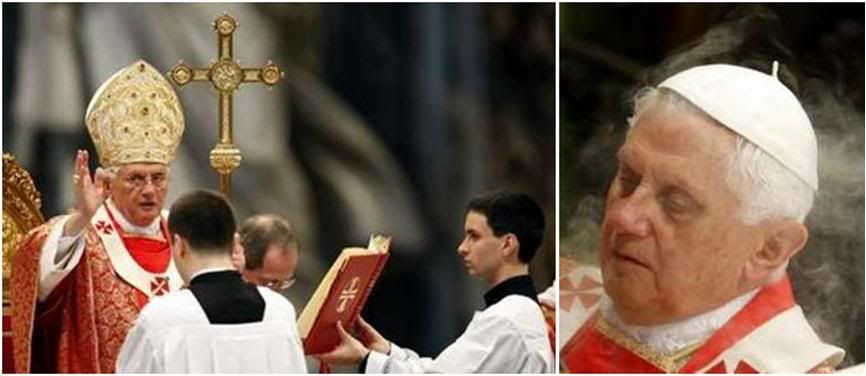
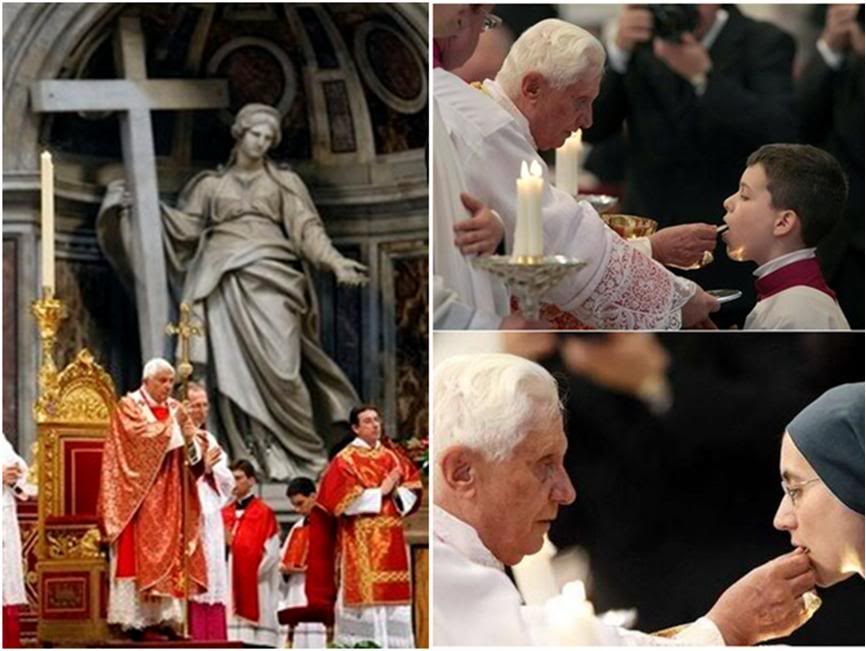 Wow! Another magnificent homily after that succession of beautiful discourses in Montecassino last Sunday. The subsequent Regina caeli mini-homily today was a most fitting companion piece. Not to mention the gem of a 'prequel' yesterday at the Marian vigil!
Wow! Another magnificent homily after that succession of beautiful discourses in Montecassino last Sunday. The subsequent Regina caeli mini-homily today was a most fitting companion piece. Not to mention the gem of a 'prequel' yesterday at the Marian vigil!
And for the fifth time in as many occasions, after Montecassino (where 'Ora et labora' is , after all, integral to monastic life), an insistent emphasis on the primacy of prayer, which he stressed even in one of his answers to the children yesterday, both personal prayer and communal prayer in the liturgy.
He has this marvelous way of referring to contemporary events and trends in concise and precise terms, without having to descend to specifics - as, for instance, a preacher like Fr. Cantalamessa often does - and yet conveying umnmistakably exactly what he is referring to.
Listening to him, as I finally was able to watch the Mass on the EWTN noon replay, I found myself wondering idly what kind of homilies people like Hans Kueng and other liberals give, and I shudder at the sheer thought of the rationalizations and accommodations they must have to make to account for their departures from orthodox Christian teaching!
*As mentioned in the AsiaNews story, the musical setting for today's Mass was Josef Haydn's 'Harmoniemesse'
performed by the Cologne Chamber Orchestra and Choir to mark the 200th anniversary of the composer's death.
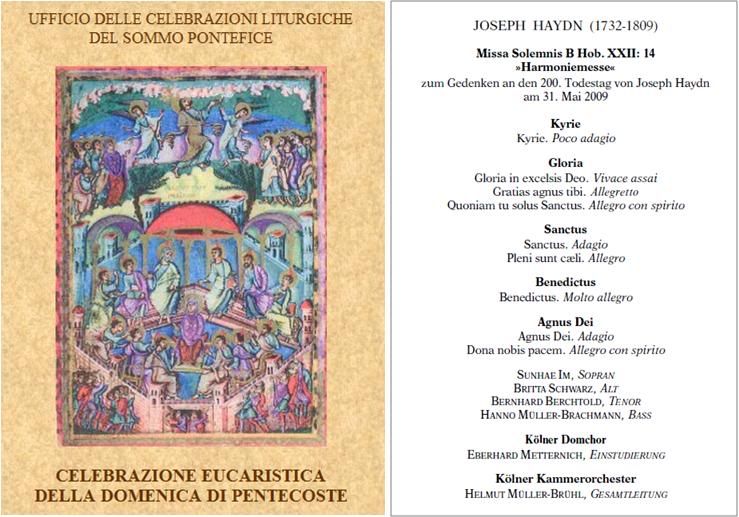
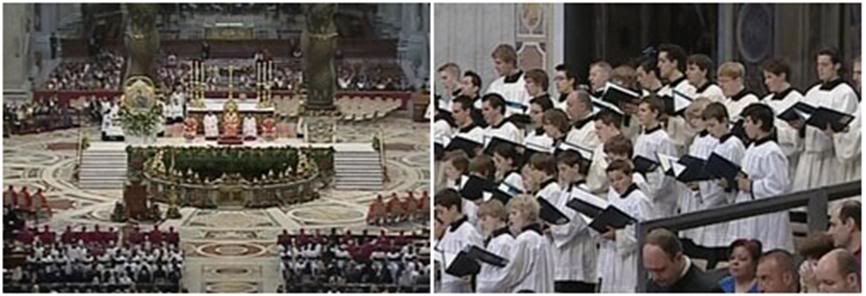 P.S. The Vatican Radio commentator identified the Cathedra used by the Pope today as Pius IX"s. I believe the chasuble is new (I'm not so keen about all the gold thread in it, but red and gold - Chinese prosperity colors - work well for the Holy Spirit (in the context of spiritual prosperity as an abundance of His gifts), whom I usually associate with white, of course, or green], and the miter was well-proportioned. Our Papino looked and sounded in great form. And I am always very relieved when he does not cough at all.
P.S. The Vatican Radio commentator identified the Cathedra used by the Pope today as Pius IX"s. I believe the chasuble is new (I'm not so keen about all the gold thread in it, but red and gold - Chinese prosperity colors - work well for the Holy Spirit (in the context of spiritual prosperity as an abundance of His gifts), whom I usually associate with white, of course, or green], and the miter was well-proportioned. Our Papino looked and sounded in great form. And I am always very relieved when he does not cough at all.
[Modificato da TERESA BENEDETTA 03/06/2009 06:34] |